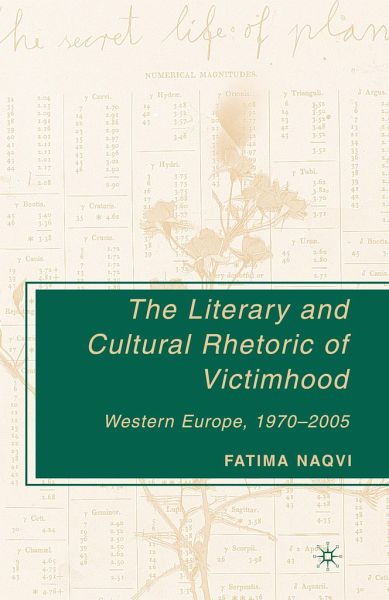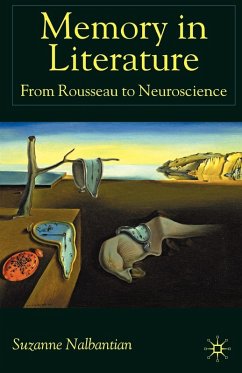
Versandkostenfrei!
Versandfertig in 6-10 Tagen
Weitere Ausgaben:

PAYBACK Punkte
19 °P sammeln!





In a series of paradigmatic readings of René Girard, Peter Sloterdijk, Michael Haneke, Anselm Kiefer, Michel Houellebecq, Elfriede Jelinek, Giorgio Agamben, Naqvi examines the current fascination with victimhood and the desire for victim status.
FATIMA NAQVI is Assistant Professor at Rutgers University, USA.
Produktdetails
- Verlag: Palgrave Macmillan / Palgrave Macmillan US / Springer Palgrave Macmillan
- Artikelnr. des Verlages: 978-1-4039-7570-6
- 2007
- Seitenzahl: 276
- Erscheinungstermin: 9. April 2008
- Englisch
- Abmessung: 222mm x 145mm x 20mm
- Gewicht: 484g
- ISBN-13: 9781403975706
- ISBN-10: 1403975701
- Artikelnr.: 22741368
Herstellerkennzeichnung
Palgrave Macmillan
Tiergartenstr. 17
69121 Heidelberg
ProductSafety@springernature.com
'Fatima Naqvi's The Literary and Cultural Rhetoric of Victimhood is among the most theoretically nuanced and compelling treatments of the contemporary preoccupation with 'the victim' and 'victimhood' I have seen. It offers a focused and penetrating analysis of the recent proliferation of victim discourse in Western culture by engaging first with some of the most important philosophical, anthropological, and psychoanalytic work on the topic and then with complex literary and cinematic works in which the problem of sacrifice and victimization is central. This study is engaging, intelligent, lively, and well written.' - Eric Santner, Author of On Creaturely Life: Rilke, Benjamin, Sebald
'This book is a highly astute study of a current
'This book is a highly astute study of a current
Mehr anzeigen
Western European rhetorical figure and cultural self-perception: that of living in a victim society. In a series of incisive readings of different literary, philosophical, and visual materials, Naqvi develops a bold and highly intriguing argument about the meaning of victimhood and about strategies of self-victimization. Conceptually rigorous and rich in analytical detail, The Literary and Cultural Rhetoric of Victimhood offers a path breaking window onto what makes seminal German, Austrian, and French writers, intellectuals, and visual artists tick today.' - Lutz Koepnick, Professor of German, Film and Media Studies, Washington University in St. Louis
'Fatima Naqvi's book opens a new and original approach to contemporary Austrian literature as well as Austrian film, represented here by the director Michael Haneke. This brilliant discourse analysis sheds light on the cultural background of the political debate about victimhood and discusses its every aspect. By looking at this debate from outside, her study reveals surprising interconnections in the literary field. Above all, it analyzes the works of Elfriede Jelinek, Friederike Mayröcker and Christoph Ransmayr with all their ambivalences and rhetorically (self-) deceptive maneuvers.' - Daniela Strigl, Germanist and literary critic, Vienna
'Fatima Naqvi's book opens a new and original approach to contemporary Austrian literature as well as Austrian film, represented here by the director Michael Haneke. This brilliant discourse analysis sheds light on the cultural background of the political debate about victimhood and discusses its every aspect. By looking at this debate from outside, her study reveals surprising interconnections in the literary field. Above all, it analyzes the works of Elfriede Jelinek, Friederike Mayröcker and Christoph Ransmayr with all their ambivalences and rhetorically (self-) deceptive maneuvers.' - Daniela Strigl, Germanist and literary critic, Vienna
Schließen
Für dieses Produkt wurde noch keine Bewertung abgegeben. Wir würden uns sehr freuen, wenn du die erste Bewertung schreibst!
Eine Bewertung schreiben
Eine Bewertung schreiben
Andere Kunden interessierten sich für













